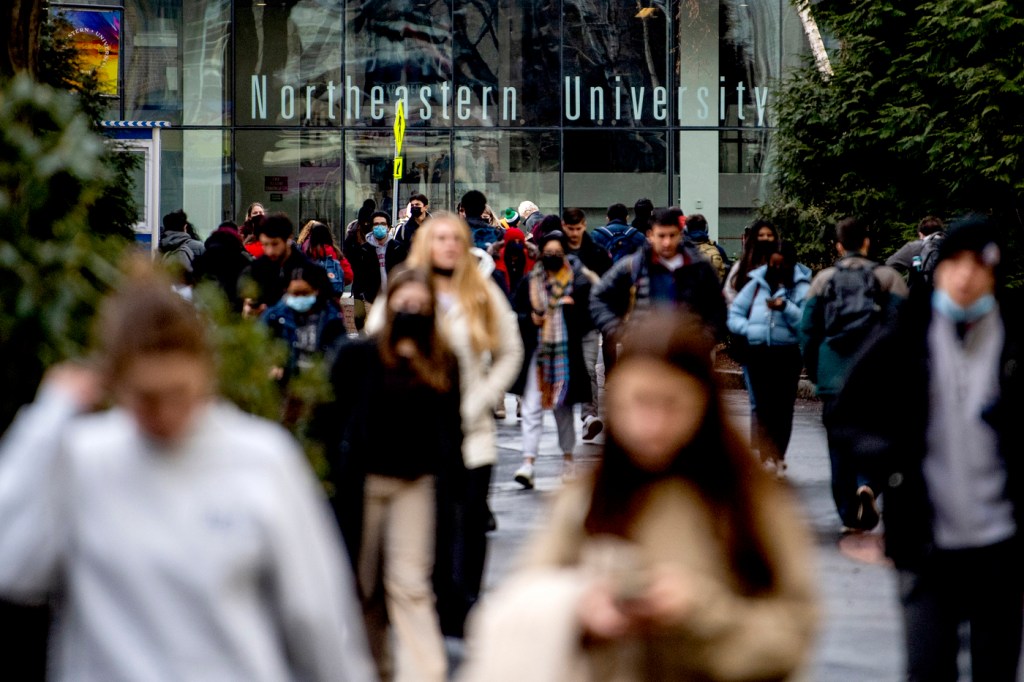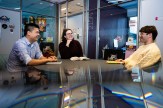Northeastern lifts most remaining COVID-19 restrictions: Guests allowed back in residence halls, more in-person activities

Northeastern University will begin lifting most of its remaining COVID-19 restrictions on its North American campuses as cases decline nationwide and across the campus community. Since students, faculty, and staff are required to be fully vaccinated and boosted against SARS-CoV-2, the coronavirus that causes COVID-19, the university is moving forward with policies that will enable the campus community to live, work, and study alongside the virus in a way that’s as close to normal as possible.
Beginning immediately, the community can host in-person events and gatherings that no longer need to undergo review, except as needed to reserve space; university-sponsored travel can also resume, but those traveling will still be required to register with Northeastern’s Global Safety and Security Assessment Committee, which will review plans that involve higher-risk destinations.
Also, effective Wednesday, Feb. 9, non-Northeastern guests will be allowed back in residence halls so long as they are fully vaccinated, masked, and comply with other policies from Housing and Residence Life.
Massachusetts Secretary of Education James Peyser praised the move, noting that “as the science, our understanding, and the tools available to address COVID-19 continue to evolve … it is critical that we give students the opportunity to engage more with their communities.”
“With Massachusetts’ status as a national leader in vaccination, it is time to navigate the careful transition into opening up our society while simultaneously employing public health mitigation strategies,” Peyser said, in a statement. “Northeastern University’s announcements today represent important steps toward that goal.”
Northeastern will still require indoor masking, as well as weekly surveillance testing on its U.S. campuses. University officials will continue to monitor the situation and update university policies as COVID-19 transitions from a pandemic to an endemic stage. University leaders are also evaluating possible changes to COVID-19 testing that could take effect later in the spring semester.
For Maxcy Grasso, a 21-year-old politics, philosophy, and economics major, the changes couldn’t have come at a better time.
“Coming back to campus I was a little worried that things would just continuously get worse,” she says. “But as this new variant kind of slows down, it’s nice to have kind of a normal semester for my final semester.”
Grasso says she’s especially excited about being able to hold events again. As a dancer, she says she’s missed attending on-campus dance performances with friends from other schools.
David Madigan, provost and senior vice president for academic affairs at Northeastern, and Ken Henderson, Northeastern’s chancellor and senior vice president for learning, and former dean of the College of Science, outlined the changes to campus protocols in an email to the community on Tuesday.
“Throughout the pandemic, Northeastern health and safety protocols have been guided by the best available science, including working with our own faculty, and informed by public health guidance,” Madigan and Henderson wrote. “We have continually adapted our protocols as needed, keeping the holistic health and wellness of our community at the forefront of our decision making.”
Changes to Northeastern’s health and safety protocols come during a steep decrease in COVID-19 cases across North America—part of what scientists and public health officials predicted would happen after the highly infectious but less deadly omicron variant reached its peak mid-January. The changes also come as local officials revisit COVID-19 protocols state by state.
While the future is still largely unknown, public health experts have suggested that the pandemic might be entering an “endemic” phase, meaning COVID-19 would become a permanent but manageable fixture in our lives, similar to the seasonal flu. Massachusetts, in particular, has seen a considerable drop-off in cases to the point that easing restrictions can help people return to a sense of normalcy, says Neil Maniar, director of the master of public health program, associate chair of the department of health sciences, and professor of public health practice at Northeastern.
“I think these measures constitute an important step toward normalcy,” Maniar says. “All of the data seems to suggest that we’re getting around to the other side of the omicron surge, and all of that data taken together shows that we can resume some of the activities that we engaged in prior to the pandemic, while continuing to exhibit precautions like mask wearing and testing when required.”
Maniar notes that the mental health toll of the pandemic on students, faculty, and staff has been devastating, and that rolling back—with caution—some restrictions will help alleviate those burdens.
“There’s plenty of research to support the importance of in-person education,” he says.
When Ishaan Desai, 18, learned of the changes, he immediately started texting his friends. The move to resume in-person activities is great, he says, because it will help students meet new people and network again.
“One of the biggest takeaways for me is now we can have non-Northeastern guests in the residence halls,” Desai. “Everyone’s pretty excited about that.”
While he is still looking forward to a full return to normal, James Telesmanic, 23, says the changes are a good intermediate step.
“I’m excited to see some normalcy because it’s been a while since I felt I was back in a traditional college setting,” he says.
For media inquiries, please contact media@northeastern.edu.






